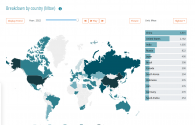You've summarized precisely the US's fantasy in these technological restrictions on China. They believe that China will never be able to recreate its own semiconductor supply chain, and even if it could, it would take several decades. I consider this nonsense, but there is still merit in considering one's options in worst case scenarios, even if such scenarios have infinitesimal probabilities.
What policymakers in Washington believe should not be confused with what those policymakers want people to believe. While none of us are aware of Washington's actual strategy and motivations, I doubt that anyone in Washington actually believes that the US can suppress China's technological advancement for any meaningful amount of time. In fact, I believe American policies are in fact a response to the realization that Chinese technological independence is an inevitability, and the economic consequences of no longer being able to dominate the high tech market globally.
US actions immediately preceding the chip sanctions reveal its true intentions, preventing Chinese tech companies from taking over traditionally US dominated markets (ie Huawei in telecommunications and consumer electronic devices). However, as the US had no alternatives ready that it could supply to those markets, it needed to buy time to give US controlled companies the time to catch up. The US economy relies on bringing in money via profits and investment from overseas markets in order to prop up an otherwise relatively uncompetitive economy. By delaying Chinese competition for a time, the US hopes it will have time to exert sufficient influence and coercion on countries within its traditional markets in order to continue maintaining its current economic system, and in order to develop alternatives to Chinese technological products that it would need to be able to offer to those nations. The narrative spun by the US is part of its influence/coercion campaign. After all, the US simply cannot tell those countries, "We need the money so we can continue to be rich, so don't buy Chinese alternatives."
2035 is the year I think that China will comfortably surpass America in nominal GDP and military as well as self producing great chips altogether. Year of great confidence.
If China plans anything kinetic, I would wait until 2035. 2040-2045 is even better. In the meantime, it could do military plane flyover to Taiwan. but dont start anything kinetic.
Nominal GDP is a meaningless statistic, and China should not plan to proactively start anything kinetic regardless.

